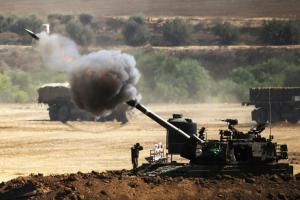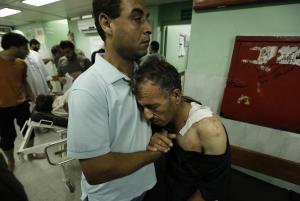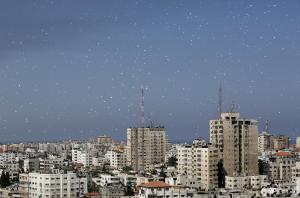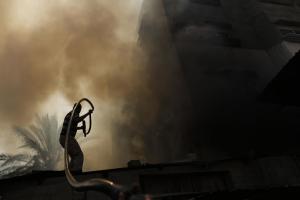Gaza City (Palestinian Territories) (AFP) - More than 100 Palestinians were killed Wednesday in the bomb-scarred Gaza Strip, among them victims of Israeli fire on a crowded market and a United Nations school.
The United States and United Nations condemned the school shelling and Hamas said it fired a salvo of rockets into Israel in retaliation for both attacks. At least 17 people were killed in the strike on the market in Shejaiya, near Gaza City, as Israel observed a four-hour humanitarian lull in other parts of the crowded coastal strip.
Thick black smoke billowed over the site as ambulances raced to the scene where bodies lay strewn on the ground, an AFP correspondent said.
At least 200 people were wounded in the strike, medics said, on a day that saw at least 111 people killed.
Early Thursday two more people died of wounds sustained previously, bringing the death toll from 23 days of unrelenting Israeli attacks to 1,363.
Hamas said Wednesday it fired rockets at Tel Aviv and the southern port city of Ashkelon "in response to the Jabalia and Shejaiya massacres", referring to the market and the school, in the north of the strip.
View gallery

An Israeli artillery gun fires a shell towards targets from their position near Israel's border …
The Israeli military said that a rocket hit open ground "in the Tel Aviv area" and another two were intercepted over Ashkelon.
It said that a total of 128 rockets fell in Israel on Wednesday, with another nine shot down by missile defences and that Israel hit 88 targets in Gaza.
Israel had said its truce, which began at 1200 GMT, would not apply in places were troops were "currently operating", hours after the army made what it called a "significant advance" into the narrow coastal strip.
Hamas denounced the four-hour lull as a publicity stunt, saying it had "no value".
- Furious response -
View gallery

A Palestinian hugs his father who was wounded in an Israeli strike on a compound housing a UN school …
The market strike came hours after Israeli tank shells slammed into a UN school in Jabalia refugee camp which was sheltering some 3,300 homeless Gazans, killing 16 and drawing a furious response from the United Nations.
"This morning a UN school sheltering thousands of Palestinian families suffered a reprehensible attack," UN chief Ban Ki-moon said on a visit to Costa Rica.
"It is unjustifiable, and demands accountability and justice."
The attack was also denounced by the White House in a carefully worded statement that avoided mentioning Israel.
"The United States condemns the shelling of a UNRWA school in Gaza, which reportedly killed and injured innocent Palestinians, including children, and UN humanitarian workers," a statement said.
View gallery

Flyers are dropped over Gaza City by the Israeli army urging residents to evacuate their homes on Ju …
Palestinian president Mahmoud Abbas wrote to Ban decrying Israel's "institutionalised disregard for Palestinian life" and urging him "to take all necessary and effective measures to provide the Palestinian people with international protection".
His letter, a copy of which was sent to AFP, accuses Israel of "war crimes" and "a terrorising campaign of mass murder".
Rights group Amnesty International urged Washington to halt arms supplies to Israel.
"It is time for the US government to urgently suspend arms transfers to Israel and to push for a UN arms embargo on all parties to the conflict," it said in a petition to US Secretary of State John Kerry.
- 'No protection' -
View gallery

A Palestinian man battles a building on fire following several Israeli strikes on Gaza City on July …
"They're bombing houses, homes, schools -- there's no protection," said Moin al-Athamna, who was at the school when the attack occurred.
It was the second time in a week that a school run by the UN agency for Palestinian refugees was hit, prompting a blistering attack on Israel by UNRWA Commissioner General Pierre Krahenbuhl.
"I condemn in the strongest possible terms this serious violation of international law by Israeli forces," he said, indicating the school's location had been communicated to the Israeli army 17 times.
"No words to adequately express my anger and indignation," he wrote on his official Twitter account, describing it as "intolerable".
In Israel, the army said three soldiers were killed in Gaza, raising the overall number of soldiers killed to 56 since the operation began on July 8.
Public radio quoted Major General Sami Turgeman, the senior officer for the Gaza region, as saying that the destruction of militants' remaining tunnels into Israel could be complete "in a few days".
Israel has said uncovering and destroying an apparently sophisticated network of tunnels is a primary goal of its assault.
- Israeli team in Cairo -
But there appeared to be no Israeli appetite for a truce, despite an hours-long meeting of the security cabinet, with a senior official telling Haaretz newspaper that the Jewish state was not even close to a ceasefire.
"When a ceasefire proposal that answers Israel's important needs is laid on the table, it will be considered," he said, warning that the military operation would expand.
"The (military) will expand attacks against Hamas and the rest of the terror organisations."
Nevertheless, a two-member Israeli delegation arrived in Cairo late Wednesday to discuss a possible ceasefire with Egyptian officials, an official at the airport told AFP, saying they were expected to leave after several hours.
Cairo, a key mediator in previous truce negotiations between Israel and Hamas, was also expected to host a Palestinian delegation later this week.
Public radio said that the full Israeli cabinet would convene on Thursday for the first time since the start of the Gaza operation.